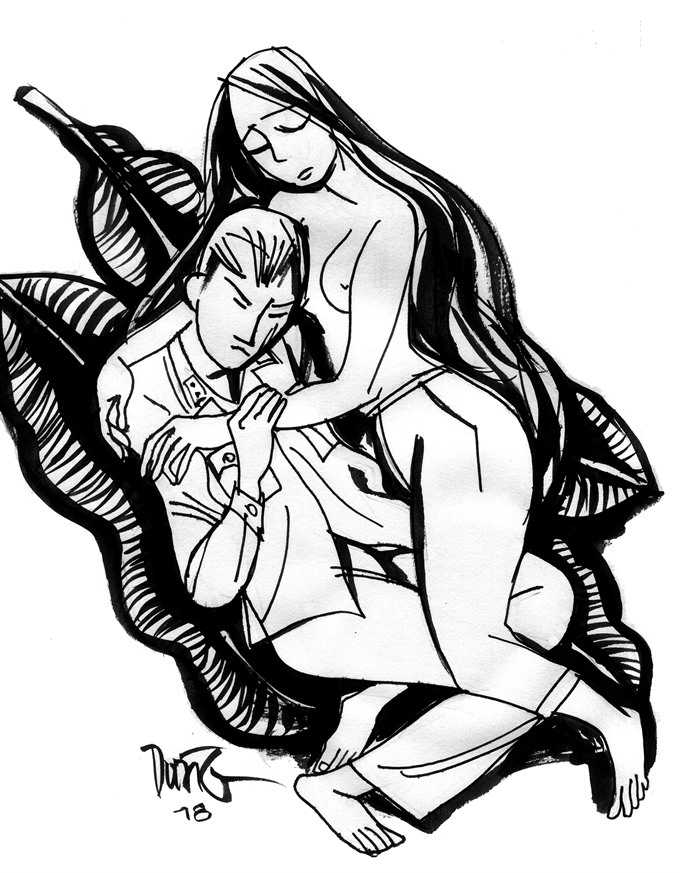

A short story by Vũ Thị Hồng
 |
by Vũ Thị Hồng
In Gia Lộc District Military Headquarters, some fifteen kilometres from the seat of the provincial authorities, there was Tuân, a single office cleaner of about forty, who with a long wooden handle broom and a big damp cloth in her hands busy all day long, sweeping the courtyards and offices and cleaning the desks and chairs. She seemed sad with some fine traces of a girl in her prime of life. She had a skinny body with a pale complexion due to illness. Her eyes looked rather strange, wild and bright, blankly staring at the vast emptiness outside.
Waking up at five in the morning, she swept both the outer and inner courtyards and the floors of the corridors and study, which were covered with cigarette butts, toothpicks, used teabags, paper and other odds and ends.
Many officers and men, newly-recruited or already-retired, came and left, yet she had stayed there year after year like part of the furniture.
She was said to have been chosen by the unit boss Tư thanks to her beauty rather than her capacity as a receptionist as she had just been demobbed from the road-opening unit of Trường Sơn battlefield. After a few months in that post, she was transferred to the cleaning section as she wasn’t a good receptionist, leading to the rumours from other officers. Worse still, she spent hours daydreaming around her house.
* * *
To the surprise of her neighbours, Tuân never welcomed any visitors. Nobody had ever come to her tiny hut, except Phương, a reporter of the provincial newspaper. She was Tuân’s close friend in the group of voluntary young female road workers.
“A reunion notice was sent to us ex-volunteers in the daily national paper Tiền Phong,” Phương said when she stepped into Tuân’s hut. She was greatly surprised at her ex-comrade’s silence. Her room looked dim in the fading winter light. On Tuân’s bed, Phương saw a thick mass of blankets. “Surely, she’s sleeping soundly under it,” she said to herself.
“You crazy friend, listen to this message written by me on your behalf, ‘Mai Thị Tuân, 45 years old and unmarried, wishes to meet her former comrades-in-arms of the Female Volunteers’ Brigade on the Trường Sơn Battlefield at our place in the Gia Lộc District Military Headquarters on….’
“What’s wrong with you?” Phương exclaimed when she found her lying on her back with a pale face and hands crossed under her neck, eyes in tears. “You’re angry with me, right?” Phương asked. Suddenly, Tuân’s skinny long fingers trembled violently as if she was having a fit. By chance, Phương saw a lot of torn pieces of paper on the ground. She picked them up. They were from the same newspaper in her hands. Lying beside her close friend in sadness and touching her thin shoulders, Phương said to her in a repentant voice, “I’m sorry you’re upset. I only want to look for that young man of yours…”
Saying so, Phương spread the blanket wide enough to cover Tuân’s body and hugged her tightly, while Tuân’s body quivered violently with her choking sobs. Tuân looked very thin with her protruding bone joints.
“Where’s the shapely body of the jungle queen?” Phương whispered to herself. “If a beauty contest had been held then, certainly Tuân would have won in terms of both behaviour and beauty.” Not only men, but also women were dazzled by Tuân’s lovely body in the fresh and clear stream water. Oddly enough, Tuân was not aware of her own beauty. She just focused on hard work all day long. She had no time to contemplate her beauty. She was worthy of being a model for any artist! What’s more, young men, officers and soldiers alike, were infatuated with her, so she was showered with letters and gifts. Poor Tuân, her gifts were almost always shared by her colleagues, whereas her letters were read aloud for all to hear and enjoy. Among Tuân’s colleagues, Phương was the one who could understand and sympathise with her feelings: her pure heart belonged to a military scout, born and bred in Hà Nội.
During a trip to take provisions and weapons back to her unit, about half a day away, she heard a train of horrible screams echoing up from a deep mountain creek. Carefully going down she found a wounded soldier trapped among thick bushes. She tried her best to pull him up to the path. His name was Chiến. A high fever had gripped him on the way home after a long scouting trip. Without her help, he would have fallen into an abyss. She rigged up a temporary hut with leaves and branches in the forest to take care of him. After a night and a day when his fit of fever had lowered noticeably she carried him on her back to a nearby field hospital before returning to her unit.
* * *
Leaving the clinic, Chiến went straight to Tuân’s place. Unluckily for him, she had just made a trip to the lowlands on business. Chiến asked Phương to hand a sealed letter to his saviour. To her surprise, when the war ended much later, nobody came to visit Tuân and she paid no attention to any youths who had tried to win her hand. When peace was restored, she left the armed forces to accept a job in the district military committee, whereas Phương became a reporter. Both remained friendly to each other, although they rarely met. For Phương, fortune smiled upon her: she got married and birthed a handsome boy. She could not hack Tuân’s way of life, resigning herself to live in the compound of the military district unit. At last, Phương found a way out for her former comrade-in-arms: to initiate a reunion of ex-volunteers of her former brigade on Trường Sơn battlefield near Tuân’s place in the hope that, among other things, Tuân might meet her old flame. Phương made up her mind to carry out her plan despite Tuân’s refusal at first. “Why has he kept so silent over the past twenty years? Is he alive or dead?” Phương often asked herself.
Beyond Phương’s expectation, she found Tuân reacted well. Phương swept her hands over her friend’s back and shoulders. Suddenly, Tuân breathed heavily then embraced her old friend tightly. Although her finger nails hurt Phương badly, she twisted her body without any complaints. When Tuân’s sharp pain eased off, Phương assuaged her in a soft voice, “Take it easy, my dear! Drink a glass of lemonade or eat a plum.”
All of a sudden, Tuân opened her eyes wide and stared at Phương angrily.
“What did you do that for? Do you pity me?”
“Oh, no no! Why do you think that?”
“Leave me alone,” Tuân said, turning her face towards the wall, covering her head with the blanket.
“Calm down,” Phương retorted and released her friend’s grip.
Picking up her bag up from the table, she let all its contents roll over the bed.
“What’s the matter with her today?” she whispered to herself. After that, she rode her bike back to work.
* * *
Suddenly, there were three loud rings of the doorbell.
In her greasy clothes Tuân slowly walked to the door. Opening it, she was so panic-stricken that she stepped backwards at once. Standing in front of her was a tall and thin elderly man that looked like a skeleton, in a faded and threadbare military uniform with sunken cheeks, high cheekbones, a sunburned complexion and glassy eyes.
“Miss Tuân, I’ve read your message,” he told her. “Although I live very far from here, I’ve given up everything to get here. Do you recognise me?”
“Frankly, not at all!” she mumbled, without looking straight at his eyes.
“Why haven’t you invited me in?” he said. “Am I so ugly? I haven’t seen you over the past twenty years. You’ve changed a lot. No beautiful features of former Miss Tuân left! However, I recognise you the same as ever.”
The skeleton slowly walked in. His loosened joints sounded weird. While she could not identify who he was, he kept coming forwards. She continued backing towards her bed in a corner of the room.
“Obviously, you’ve failed to recognise me,” he told her. “Previously, you always hid whenever I reached your place then drove me away. I knew that I was nothing but an ugly man among many handsome youths. Those days, you were proud of yourself as a queen, beyond my reach. Well, where are the suitors now? Poor you, you’ve turned out terribly!”
The skeleton suddenly seized her shoulders and shook them violently with his strong hands, sending off a deadly stench, which made her tremble. “I’m very happy to find you here. Will you accept me or chase me away as you did before? Tell me whether you love me or not,” he asked.
She tried to remove his pointed fingers in vain.
“Now how can you run away? You belong to me forever,” said the skeleton, laughing detestably. “You’re nothing but a dry skeleton unworthy of being conquered,” he added, bending down his horrible face closer to hers.
She screamed out in terror.
Luckily for her, it was just a nightmare. That night she was unable to sleep.
* * *
Three days later, she heard two short rings on her doorbell.
This stranger was a bearded man of about forty. He looked fairly handsome with big and sharp eyes.
“Hi Tuân! Do you recognise me?” said the newcomer with a sweet smile while she was preparing dinner.
“Please, help yourself to a hot cup of tea,” she told him.
“Allow me to introduce myself first,” he said. “I’m Bạo, the boy who got malaria and shared the same first-aid station with you at the foot of the Ba Cô Pass in 1974…”
“Which Bạo? Sorry, I can’t recollect that event at all,” she uttered in an embarrassed voice, while she was trying to rack her brain.
“It happened a very long time ago,” he told her, taking out of his breast pocket a piece of paper cutting from an old daily before handing it over to her. “I’ve been looking for you for so many years, but all my efforts came to nothing. Not until a few days ago, did I see this piece of information about your whereabouts. At once, I left Đắk Lắk on my motorbike. It took me two days to cover that long distance. Now, I feel very happy to find you quite well but changed a bit, just a bit.”
“You shouldn’t be so gallant,” she smiled warmly. “I became a crazy old woman a long time ago. My hair has turned hoary and my complexion is rough. Supposing that you saw me in the street, you could hardly recognise me.”
“How can you say so?” he said, bending down his head in front of her, eyes in tears. “Try to recollect the days we stayed at the first-aid station at the foot of the Ba Cô Pass. I was then a boy in my late teens on the way to the southern battlefield. It was at the road section of your unit that I suffered from malaria. Owing to the high fever, I went so mad that I sometimes undressed, smeared my whole body with mud and shrieked wildly. You were often tortured terribly by a high fever too. Yet, when recovering, you walked into the forest to search for me, washed my head and dirty clothes in the stream before taking me back to the station. You also mended my old pieces of clothing. You looked after me better than my sister. Without such care, I would have died in the deep jungle. Strangely enough, you’ve forgotten your poor little brother Bạo,” he reproached her bitterly.
After a lengthy rebuke, he held her rough hand and applied it to his face. “My dear sister, actually I’ve fallen in love with you since then,” he declared seriously.
In confusion, she let him kiss her on the hands, forehead and cheeks while his hot tears spilled over her face.
In fact, she could not forget those days’ woe at the foot of the Ba Cô Pass, far from the road to critical engagements with heavy bombardment, with a great number of wounded soldiers huddled together in the field clinic, with the bravery of conscripted female volunteers in charge of mending roads to the frontline, with the medical workers’ wholehearted devotion to patients and, last but not least, with Tuân’s care for him?
Tuân also remembered the moment that Bạo said goodbye to her before he left the clinic for the battlefield in the South. Suddenly, he embraced her tightly and sobbed his heart out. “My esteemed sister, I love you dearly. I’ll never forget you,” he blurted out. “Dear sister, allow me to kiss you, just once. I’ve never kissed a girl. I might die before I do,” he added.
“Enough of your gloomy talk!” she warned him. Staring fixedly at his face, she gave him a warm kiss on the lips.
* * *
A few minutes later, Tuân softly took off his fingers, heaving a sigh.
“Well, let bygones be bygones,” she said. “How are you getting on? How many children have you got? What about your job?” she asked him.
“I remain single, sister. After 1975, I stayed behind in the South for nearly three years while most of my comrades-in-arms returned to the North. After that I was dispatched to Cambodia’s battlefields. When I was wounded I returned home to Việt Nam. I decided to resume my unfinished course at my university. Now I’m a construction engineer,” he told her. “What about you? Where are your husband and children? Perhaps they’re out, I think.”
“Regrettably, I’ve stayed single since then. Neither husband nor children! Nobody wants to marry such an old and ugly woman as me,” she uttered a deep sigh.
“Dear sister,” Bạo was going to say something to her, but he stopped short. “I’ve been waiting for you so many years. Now you must be mine. I can’t lose you once again.” Saying so, he moved closer to her then suddenly hugged her tightly before taking her to the bed.
* * *
“Bạo, you’d better forget me and return to your family that was looking forward to your homecoming. Just take it for granted that there was nothing special in our relationship,” she persuaded him.
“No, never! I’ll take you out of this indecent corner. Do you want to stay with me in Đắk Lắk?”
“Thanks for your good intention!” she exclaimed. “My life will end here. For me, that’s fine. If you still think of me…”
“That’s a crazy idea! I’ll return home to solve everything. Then I’ll get here to welcome you home. You’re the sole young woman worthy of being loved in my eyes. Don’t give me up, my dear honey!”
* * *
Several days after Bạo left, the seat of her Military District was bustling with many visitors coming to Tuân’s humble house. Among them was a high-ranking retired military officer, some drivers in transit en route from Việt Nam to Laos, many friends in her former platoon, some with their kids and a company director in an expensive limo. Sadly, Phương, the initiator of this reunion was nowhere to be seen. Perhaps, she was on a business trip abroad. As a result, Tuân was so busy all day that she had little time to think of Bạo. She was on tenterhooks as if something important might wait for her. Time and again, a nightmare came to her during her broken sleep. This night was the same. When she saw off the last visitor to the gate and was going to go in, a car screeched to a halt outside the compound.
“Who comes here so late at night?” she asked herself. Walking back to the gate, in the dim light, she saw a man in a black overcoat with a felt hat covering his whole forehead.
“Who’s that?” she asked in a quivering voice.
Without answer, the man slowly proceeded to the gate. Taking a piece of paper out of his pocket, he said in a bossy voice, “Is this your short notice written by Phương?”
“Yes, It’s …, it’s…mine,” Tuân mumbled.
He stood motionless, staring at her, then dropped the notice onto the ground and rushed towards his car. Looking after the moving vehicle for a while, she remained unable to identify him. “Why did he run away so hastily?” she asked herself. Stooping down to pick it up, she tore it into pieces. After that she walked into her hut and looked for a small bottle of sleeping pills. Putting a few into her mouth she swallowed them up with a glassful of water to get a deep sleep. Half an hour later, she found herself gliding over the lawn, the forest and land that she had never set foot on. After that, she flew over the deforested stretches of jungle and bomb craters. Then she found herself standing on a mountain peak, staring at a deep abyss below. From the bottomless pit a cold draught of air rose up with a horrible human voice.
“Help Help! Anyone? It’s Chiến!”
“Don’t worry! Tuân’s here to save your life.”
All of a sudden, a sharp rock pierced through Tuân’s shoes. She lost her balance and fell down to the deep huge gorge. She cried her heart out, arms and legs spread wide to find something to keep her back. Unexpectedly, a strong hand lifted her out of the vast emptiness. It turned out to be an awful nightmare.
* * *
“Terrible! How wildly have you shouted?” a stranger bent down his head, closer to Tuân’s face. “Mai, fetch me a warm glass of water,” he said softly to his little girl between seven and eight.
A moment later, when she regained consciousness, she went to the next door neighbour to borrow a thermos flask of boiling water to prepare tea to welcome a visitor who had spared no pains to look for her. Blinded due to war, wherever he wanted to go he was led by his child. Of course, Tuân did not remember this war invalid at all.
“Obviously, you would hardly know me, dear Tuân,” he told her, a warm glass of tea in hand. “I’ve never met you before. I belonged to a platoon staying on the Việt Nam-Laos borderland. I was not lucky enough to enter Sai Gon during our victory day. Before that, I had been seriously wounded near Đắc Pét and treated at various clinics, big or small, including in Nghĩa Đàn District. As a seriously disabled soldier, I did not dare return home for fear that I might cause lots of trouble for my young wife. Therefore, I made up my mind to stay there for good. Undoubtedly, she knew that I was still alive. At last, she went to this health centre to look for me. Fortunately for us, we’ve got this beloved daughter, you see.” Listening to his lengthy narrative, Tuân still felt something secret in his voice.
“You still miss Chiến of Hà Nội, don’t you?” he asked her abruptly.
“Yes. What happened to him?”
“He might never return home.”
“What do you mean? Is he alive? He must be alive!”
“He might have died on the battlefield, I think,” he replied, tears in his eyes.
“Come what may, don’t hide the truth,” she entreated. “I’ll look for him at any cost, providing he’s still alive.”
He helped the little kid stand up. Both started to leave. Reaching the gate, he slowly turned. “It’s no use waiting for him! I myself don’t know his whereabouts. Over the past fifteen years since the day I met him in the field hospital. It was there that he told me everything about you. In fact, I’ve broken my promise to him when I came here to meet you. Yet, I’m unable to do otherwise. Please forgive me,” he said.
Tuân left home that afternoon. Still, she hasn’t returned to her hut in Gia Lộc District.
Translated by Văn Minh




